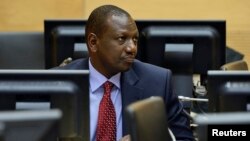The International Criminal Court has rejected a request from Kenya's deputy president to begin his trial in Africa.
The ICC said Monday that the trial of Kenyan Deputy President William Ruto will commence September 10 at the ICC's headquarters in The Hague.
Ruto and co-accused Joshua Arap Sang are facing charges of crimes against humanity, for allegedly helping to organize deadly ethnic violence that followed Kenya's 2007 presidential election.
Defense lawyers had asked the ICC to hold at least parts of the trial in Kenya or neighboring Tanzania.
An ICC statement said judges favored the idea in principle but decided to hold the trial at the Hague because of several factors, including security, cost considerations, and the potential impact on victims and witnesses.
Monday's decision does not affect the trial of Kenyan President Uhuru Kenyatta, who is also facing charges of crimes against humanity in connection with the Kenyan post-election violence.
Kenyatta's trial is due to begin November 12 in the Hague.
More than 1,100 people were killed and several hundred thousand displaced in riots and fighting that erupted across Kenya after the disputed 2007 election.
The president, his deputy and Sang are all cooperating with the ICC and appeared before the court in April 2011. All have denied the charges against them.
Despite the charges, Kenyatta won a first round victory in Kenya's March presidential election, with Ruto running as his deputy.
The ICC said Monday that the trial of Kenyan Deputy President William Ruto will commence September 10 at the ICC's headquarters in The Hague.
Ruto and co-accused Joshua Arap Sang are facing charges of crimes against humanity, for allegedly helping to organize deadly ethnic violence that followed Kenya's 2007 presidential election.
Defense lawyers had asked the ICC to hold at least parts of the trial in Kenya or neighboring Tanzania.
An ICC statement said judges favored the idea in principle but decided to hold the trial at the Hague because of several factors, including security, cost considerations, and the potential impact on victims and witnesses.
Monday's decision does not affect the trial of Kenyan President Uhuru Kenyatta, who is also facing charges of crimes against humanity in connection with the Kenyan post-election violence.
Kenyatta's trial is due to begin November 12 in the Hague.
More than 1,100 people were killed and several hundred thousand displaced in riots and fighting that erupted across Kenya after the disputed 2007 election.
The president, his deputy and Sang are all cooperating with the ICC and appeared before the court in April 2011. All have denied the charges against them.
Despite the charges, Kenyatta won a first round victory in Kenya's March presidential election, with Ruto running as his deputy.





